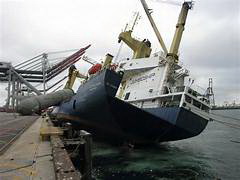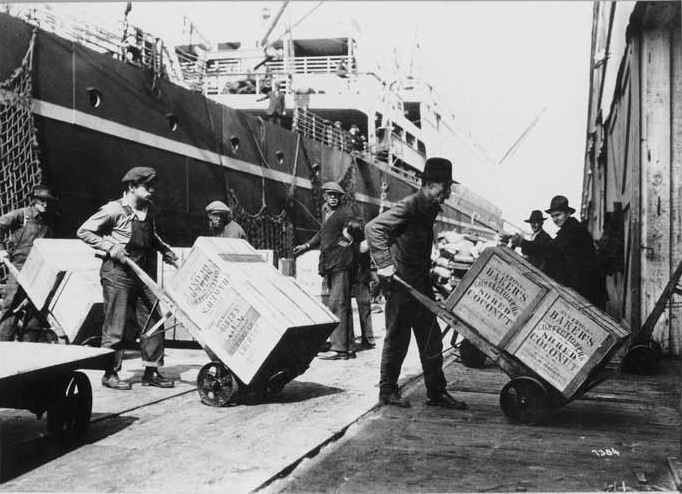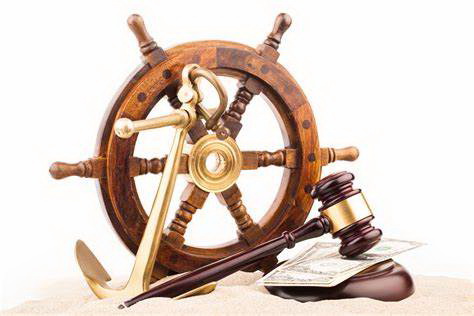Mitch | October 17, 2024 | Alabama Law, Boating and Maritime, Personal Injury, Workers' Compensation

If you’ve suffered a maritime injury, understanding your rights and potential compensation is crucial. Whether you’re a seaman, longshoreman, shipyard worker, or offshore worker – navigating the complex world of maritime law can be challenging. This comprehensive guide will help you understand your maritime injury rights and compensation options, ensuring that you can protect your interests if you sustain an injury while working on or near the water.

Understanding Maritime Laws and Your Rights
Maritime injuries are typically covered under one of three main laws, each affecting your rights and compensation:
- The Jones Act and General Maritime Law: Applies to seamen and crewmembers of ships, vessels, and other floating platforms operating in navigable waters. This includes most workers aboard floating oil and gas platforms.
- The Longshore and Harbor Workers’ Compensation Act (LHWCA): Covers maritime workers who are not seamen, such as dock workers, longshoremen, and shipyard employees.
- The Outer Continental Shelf Lands Act (OCSLA): Protects workers on fixed (not floating) offshore drilling/production platforms and other fixed structures in U.S. federal waters.

Knowing which law applies to your situation is crucial for understanding your maritime injury rights and the compensation you may be entitled to receive.
Steps to Take After a Maritime Injury
To protect your rights and potential compensation after a maritime injury:
- Report Your Injury Immediately:
- Inform your supervisor or employer as soon as possible.
- File a written accident report and keep a copy.
- Seek Medical Attention:
- Get medical care immediately, even for seemingly minor injuries.
- Inform the medical provider that your injury is work-related.
- Keep all medical documentation.
- Document Everything:
- Take photos of the accident scene and your injuries.
- Collect names and contact information of witnesses.
- Keep records of medical bills and correspondence with your employer or insurers.
- Maintain a personal journal documenting your recovery process.
These steps are crucial for supporting your maritime injury rights and compensation claim.

Maritime Injury Compensation Options
Your compensation options depend on the applicable maritime law:
Maritime Injury Rights and Compensation Under the Jones Act and General Maritime Law
Seamen are entitled to “maintenance and cure” regardless of fault:
- Maintenance: Daily living expenses during recovery;
- Cure: Payment for necessary medical treatment by their choice of physician;
Additionally, if your employer’s negligence contributed to your injury or if the vessel on which you were injured was unseaworthy (unsafe), you may be entitled to further compensation including pain, suffering, and lost wages.

Maritime Injury Rights and Compensation Under the LHWCA and OCSLA
The LHWCA and the OSCLA are federal worker’s compensation laws and are very similar to one another in the rights and benefits that they provide. They are usually more beneficial than state workers’ compensation laws. Injured victims covered by these acts are eligible for:
- Medical expenses by their choice of physician;
- Disability benefits both during time off work and for permanent injury / loss of earning capacity;
- Vocational rehabilitation;
Other Things You Need To Know
- If your employer fails to secure insurance as required by law, you could be entitled to additional penalty amounts. These amounts serve as punishment for the employer’s failure to secure compensation insurance. There are also penalties provided for failure to pay compensation in a timely manner under certain circumstances.
- Maritime workers in a shipyard, on the docks, or at the waterfront, are covered under LHWCA. The workers benefits and rights under the LHWCA are usually much more generous than under the Alabama act.
- Vessel crewmembers and offshore floating platform workers are covered under the Jones Act and General Maritime Law. Again, your rights and entitlements are completely different than under the Alabama act.
- If your injury is caused by the negligence of a person or company other than your employer (such as a subcontractor), then you may also be able to bring a separate injury claim. This situation usually arises when there are subcontractors or workers from other companies on the same jobsite as you.
Dealing With Insurance Companies
REMEMBER that it is very important that you act cautiously when interacting with maritime insurance adjusters:

- Keep in mind that the job of the insurance adjuster is to pay you as little as possible. They will examine your case with a magnifying glass to try and deny your claim or to minimize your benefits.
- They will try to steer you towards using their doctor for treatment. Avoid this at all costs. Many “company” doctors are predisposed to giving you the least amount of time off work possible and to award you as little disability as possible. Under the Jones Act, the LHWCA, and the OCSLA, you are entitled to your choice of physician for your treatment. If the insurance adjuster doesn’t want to provide this choice to you, consult an experienced maritime injury lawyer immediately.
- Do not provide any recorded statements to the insurance company and do not sign any releases or other documents without legal advice.
- Under the Jones Act, you are entitled to “maintenance” payments, which are designed to cover your living expenses such as food, lodging, and transportation to the doctor. If you are not receiving these payments while you’re off work, or if the payments are insufficient to cover your living expenses, consult an experienced maritime lawyer immediately.
- Under the LHWCA and the OCSLA, your compensation payments should equal 2/3 of your average weekly earnings for the year prior to your injury. If you don’t believe you are being paid correctly, consult an experienced maritime lawyer immediately.
Time Limits For Maritime Injury Claims
Be aware of the STATUTE OF LIMITATIONS for filing maritime injury claims:
- Jones Act and General Maritime Law claims typically must be filed in court within 3 years of the injury.
- LHWCA and OCSLA claims usually need to be filed with the Department of Labor within 1 year of the date of your last payment of compensation.
Missing these deadlines can result in losing your right to compensation, so act promptly to protect your maritime injury rights. KEEP IN MIND that while these time limits apply in a majority of cases, there are other factors and consideration that may make the limitation time SHORTER or LONGER than indicated here. Consult an experienced maritime lawyer to determine the limitation periods which are applicable to your specific case.

Consult With A Maritime Injury Attorney
Maritime law is complex, and the stakes are often high in these cases. An experienced maritime injury attorney can help you understand your rights, navigate the legal process, and ensure that you receive fair compensation for your injuries. Since 1952, attorneys with the Lattof & Lattof law firm have been helping victims of maritime injuries, as well as all other types of injury and accident cases. We understand the unique challenges faced by those who work on and around the water, and we’re committed to protecting your rights and interests.
It would be our pleasure to review your case with you and discuss your rights, remedies and options. Our goal is to equip you with the facts that you need to make an informed decision on whether or not to hire a lawyer. Get in touch with us now for a FREE consultation, either by calling our office at (251) 432-6691 or filling out an online request form [link]. We’d be delighted to represent you and your loved ones and help you to obtain the compensation you deserve.
Remember, your health and your rights are important. Don’t let a maritime injury derail your career or your life. Take action to protect yourself and your future.